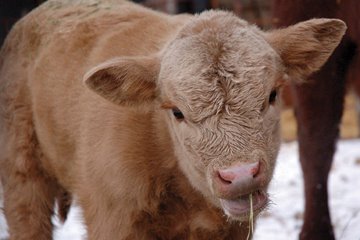R-CALF PRESS RELEASE
February 17, 2009 Billings, Mont. – Just days ago, R-CALF USA CEO Bill Bullard participated in a two-day conference hosted by the Western Organization of Resource Councils (WORC) that included representatives of the U.S., Canada and Mexico in discussions of the North American Free Trade Agreement (NAFTA) and the negative ramifications the trade agreement has wrought on producers in all three countries, while the multinational corporations in each country have reaped the benefits. Each group’s representatives made it clear that NAFTA should either be eliminated or renegotiated.
“R-CALF was originally viewed as a threat to cattle producers in Canada,” said Neil Peacock, who represented the National Farmers Union of Canada. “There is always misinformation going around, and several years ago, there was the rumor that R-CALF was established by the big packers.
“What has happened is that the mind shift of livestock owners in Canada has turned around,” he continued. “We no longer view R-CALF as a threat because our cattle producers are facing the same challenges as independent U.S. cattle producers. Just like R-CALF members in the U.S., we are fighting the packers, the mega-corporations and the ramifications of NAFTA and the WTO. It would be nice to unite with R-CALF to fight the issues we have in common.”
Jan Slomp, also of the National Farmers Union in Canada, said consumers in all three countries need to be able to know where their beef comes from and be able to support their domestic producers if that is what they wish to do.
“XL/Cargill keeps feeding us this line that R-CALF is just a protectionist organization against everything,” Slomp said. “We’ve been fed this bull about continental integration, that increases in exports will benefit ranchers and farmers, and that’s just not true. We’ve been sucked into this corporate structure that is very, very hard to correct. It’s all about a forced food system now. Trade should not be so complicated. Every nation has the right to look after is own producers.
“Authorities here are influenced by the Cargills and make R-CALF the enemy and try to mobilize all the Canadian ranchers against R-CALF, which is not helpful at all,” he continued. “I can totally understand and defend R-CALF in public now. We need to be allies with R-CALF.”
Dennis Olson, a senior policy analyst at the Institute for Agriculture and Trade Policy (IATP) said that promises made by the proponents of NAFTA have not been kept and that new policies are urgently needed.
“As far as NAFTA goes, it’s a failed agreement,” Olson said. “It has not curtailed the growing power of the global meat cartels, both in our livestock markets and in our politics. NAFTA impedes the rights of all three countries to establish their own food and agricultural policies that provide farmers with the cost of production, as long as those policies do not result in the dumping of agricultural commodities into the other markets at below the cost of production. We commit ourselves to building an alternative food system that is designed to make safe, affordable food a higher priority than increasing the profit margins for the global meat cartels.”
Patty Lovera, with Food and Water Watch, said she was at the meeting to talk about how to work together to stop the negative impacts caused by bad trade policies. She also noted that even as prices livestock producers receive continue to go down, retail food prices rarely do, and the result is that consumers do not end up spending less at the meat and dairy case.
“Consumers care about workers, farmers and the environment – all of which are damaged by trade policy that puts corporate controlled trade as its top priority,” she said. “But consumers also are directly impacted when trade policy means they are exposed to unsafe food or lose the ability to know what they are eating, where it is from or how it was processed.
“The growing number of food safety scares, from both domestic and imported food, has made it very clear that regulators are not doing enough to protect consumers,” continued Lovera. “Consumers have no way to influence the governments of other countries on what they do to regulate food safety, but have to live with the consequences of what those governments do, and there must be room in our trade policy for antitrust measures so we can restore competitive markets for producers and prevent a handful of corporations from calling all of the shots about how our food system works.”
R-CALF shared with the producers from Canada and Mexico the work it is doing to prevent the proposed acquisition of National Beef Packing Co. by JBS, the world’s largest beef packer based in Brazil.
“This merger would increase packer concentration to an unprecedented level, resulting in reduced competition that will harm both cattle producers and beef consumers,” said R-CALF USA CEO Bill Bullard. “We were pleased to learn that Canadian producers support R-CALF’s efforts to prevent further concentration in the meatpacking industry and to eliminate anticompetitive cattle procurement practices going on in each of our countries. We look forward to sharing information with Canadian producers that will help both Canada and the U.S. restore competition for all cattle farmers and ranchers.”
Welcome to the Online Edition of Cattle Country!
Updated with every new issue
Past issues will be available in the archive. If you are interested in reading Late Breaking News between paper deadlines, scroll down to the bottom of the page. The most recent information will be posted first.
Past issues will be available in the archive. If you are interested in reading Late Breaking News between paper deadlines, scroll down to the bottom of the page. The most recent information will be posted first.

Friday, March 13, 2009
Subscribe to:
Post Comments (Atom)

No comments:
Post a Comment